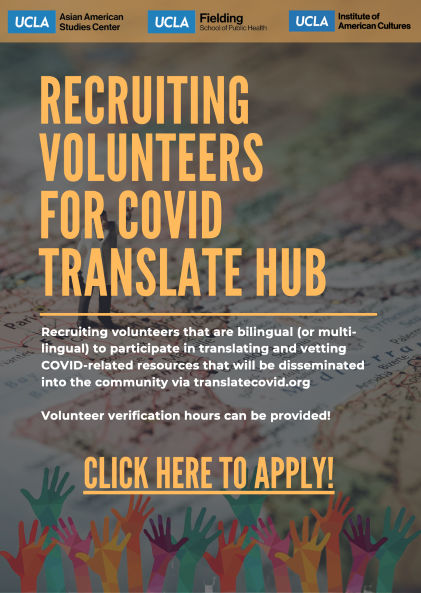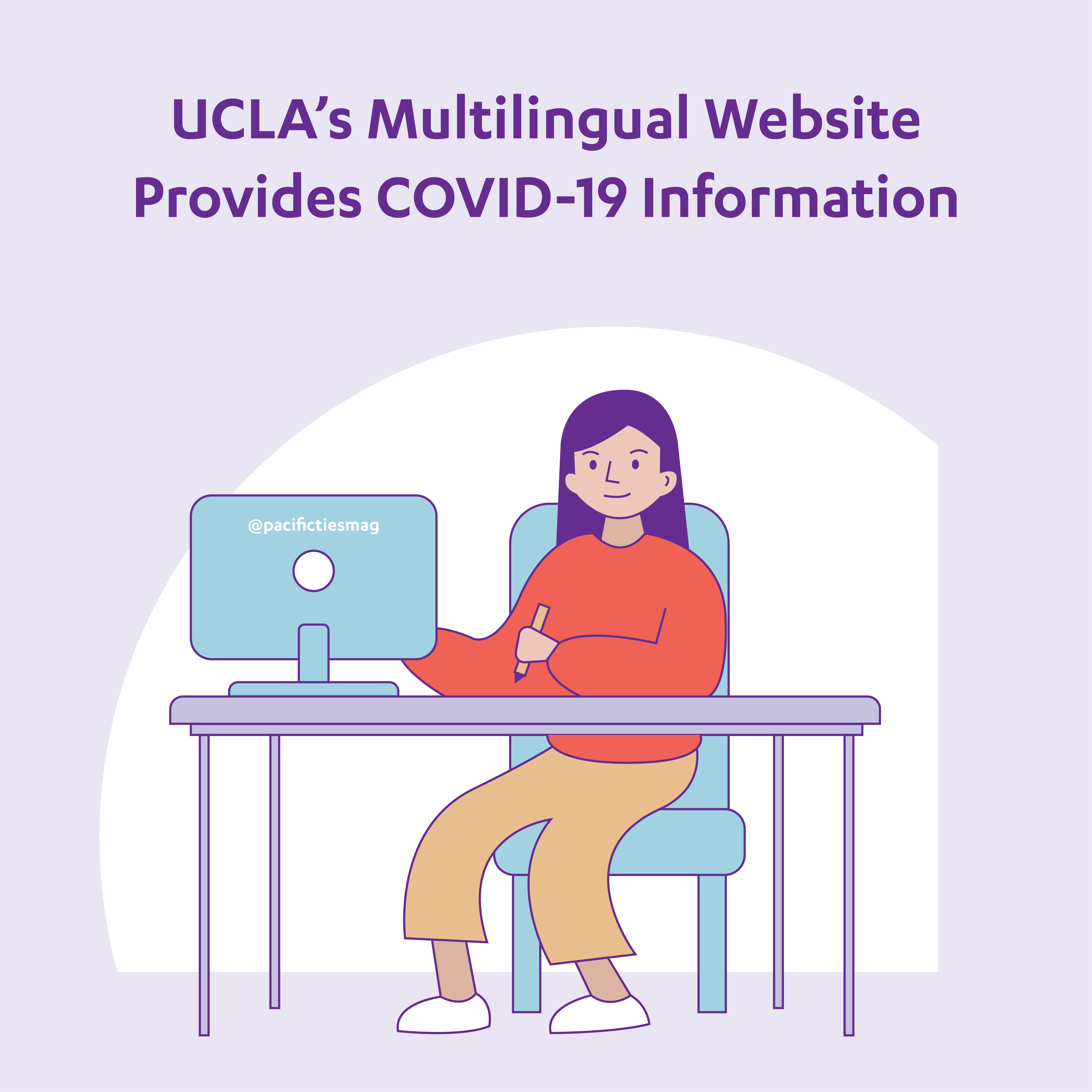In the wake of COVID-19, some communities have felt the pandemic’s effects more acutely than others. The CDC reports that racial and ethnic minority groups have been disproportionately affected by COVID-19, with some contributing factors including language barriers and lack of access to healthcare information. TranslateCovid.org is a COVID-19 multilingual resource hub created to address this issue, initiated as a collaboration between the UCLA Asian American Studies Center and the UCLA Fielding School of Public Health.
“[Immigrant communities] often don’t have access to breaking information and life-saving information about important developments — in this case, a pandemic,” Karen Umemoto, director of the Asian American Studies Center and a principal investigator of TranslateCovid.org, said. “What can we do to help address this problem of lack of information for Asian American Pacific Islanders who do not speak English? So we thought, though we could not translate all the information that was coming out, we could be an aggregator of translated materials, and we could create a user friendly interface for anyone anywhere in the world to be able to access materials in their native language on important topics.”
From the website’s launch in May 2020 to late January 2021, TranslateCovid.org has garnered 8,618 users and 25,984 page views. Most of the site’s traffic comes from the U.S., accounting for over 75% of users, though it also attracts users from over 15 countries, with the top languages being English, Spanish, Chinese, Korean, Vietnamese, Arabic and Japanese.
Currently, the website provides resources in 60 languages and addresses topics they feel are most relevant at that time. For example, at the beginning of the pandemic, TranslateCovid.org focused on prevention measures. Led by Janet Chen, ethnocommunications assistant director in the Asian American Studies Center, TranslateCovid.org created videos about three main preventive measures: handwashing, mask wearing and social distancing.
Currently, these videos have been translated into six languages, including Armenian, Spanish, Farsi, Hindi, Korean and Vietnamese. In line with their goal to serve areas of greatest need, they decided not to translate their videos into Chinese, as there were already several resources available in Chinese about similar topics.
AlthoughTranslateCovid.org was in part headed by the Asian American Studies Center, it was also developed with support from partner research centers, including the Ralph J. Bunche Center for African American Studies, American Indian Studies Center and Chicano Studies Research Center. The site focuses on the most linguistically isolated groups in Los Angeles County, including but not limited to Asian Pacific Islander communities.
May Wang, a professor of community health sciences in the Fielding School of Public Health and a principal investigator of TranslateCovid.org, also serves on a communications subcommittee of the LA County Department of Public Health. With input from this subcommittee, the TranslateCovid.org team has continued to shift their focus to assess and target areas of greatest need as the pandemic has developed.
“Prior to December and holidays were coming, we were looking for materials on how to stay safe with the holidays, advice around travel, families getting together,” Wang said. “Trying to get that message [about social distancing] is very difficult because people are thinking, ‘This is my daughter or my son.’ The whole idea of social distancing from them, even though they live in another household, is just really hard for a lot of people to accept and understand.”
Moving forward, the team anticipates that disseminating credible information about vaccines will be most crucial.
“There is very little translated on basic facts about vaccines from credible sources, and there are lots of myths and rumors about vaccines,” Umemoto said. “Some people think they make you sterile, and there are so many outrageous rumors out there that could dampen people’s enthusiasm about being vaccinated, so getting proper, accurate information out about vaccines in different languages is going to be really important in this next period of time.”
Additionally, in response to the recent increase in racist harassment and attacks, TranslateCovid.org hosts an anti-hate tab, which provides resources for reporting hate crimes. Wang notes that though they don’t have the resources to do this yet, she hopes that in the future, they can develop more messaging about how to respond to hate crimes and what people can do besides reporting.
“As the pandemic spread, we noticed that there was an increase in anti-Asian hate crimes and harassment and violence, so we thought that there was a need,” Umemoto said. “It’s not medical information, but it’s closely related to the spread of the virus. Especially after President Trump insisted on calling it the Chinese Virus or the China Virus, it really became inextricably linked at that point, so to expand the services that we offer on the website, we included ways that people can report these incidents and get the proper assistance.”
As a multilingual COVID-19 resource hub, the site also aims to provide information applicable to a wide audience. With this goal in mind, they decided they wouldn’t post local information, such as where to obtain COVID-19 tests or vaccines in certain regions. Additionally, according to Wang, this information changes rapidly, and their team doesn’t have the resources available to update and verify this information daily.
Jessica Pham, a fourth-year Asian American Studies student and Asian American Studies Center intern, also helps achieve this goal, serving as the volunteer coordinator for TranslateCovid.org. After student volunteers input resources onto an Excel sheet, Pham vets them. She ensures all resources come from credible sources and are general enough to be relevant to a wide audience.
One issue Wang points out is that because student volunteers search in English, there are likely resources in other languages that they may not stumble across. Additionally, they don’t always have resources available to vet the in-language version. For example, if an organization has a resource in English and another language, they read and vet the English resource; if they don’t have a volunteer who can read the other language, they have to assume that if the English resource is accurate, the in-language translation is accurate too.
In addition to accuracy, volunteers vet for readability as well. Given their target audience, they have to ensure resources are clear and easy for a layperson to understand.
“It’s not only about translating to another language,” Wang said. “It’s translating it in a way that’s simple enough for the layperson to understand. So the English version, we can vet that, but the in-language version, we often skip that step.”
To remedy these issues, the TranslateCovid.org team tests their materials with native speakers. For example, Pham’s family are Vietnamese immigrants, and she occasionally asks her mom, aunt or older community members to assess materials.
“I had my mom and my aunt look at it and ask them, ‘Hey, could you understand what they’re saying?’ or ‘Do you have any questions that you felt like that wasn’t answered in this FAQ?’” Pham said. “So we’ve been doing a lot of pretesting stuff, both content wise, like the actual information, [and] getting them to sit down to use the site. Because I think our site is pretty simple but there’s always room for improvement, to make it even more easy to use for those that might not be so tech savvy or might not have a wide vocabulary in the English language.”
Pham stresses the importance of site layout and user interface. She points out that people have varying levels of technology literacy, including her mom, who found navigating the site to be difficult at first. Still, Pham says her mom has found the site to be useful, and it’s sparked new conversations or questions about COVID-19 from her.
Wang, Umemoto and Pham all emphasize the importance of volunteers, who provide their free time to search for resources and aid in the website’s efforts. As the volunteer coordinator, Pham works closely with student volunteers, commending them for their passion and communication in their work for TranslateCovid.org.
“It makes the work very enjoyable, and I think it’s just really interesting to be able to be part of such a project, especially during the pandemic,” Pham said. “I think during the pandemic, personally for me, when it first happened, I always felt like, ‘Oh, I needed to do something to be involved to help out my community,’ and I think this was such a great opportunity to do so.”
Pham says that in the next month, they hope to expand their pool of volunteers and provide more opportunities for students to get involved.
“This is a time of uncertainty,” Umemoto said, “but one thing is certain is that UCLA students are poised to play a very important role in addressing these kinds of issues and problems going into the future. Now’s a good time to start getting involved in all of this, and we encourage you to reach out if you’re interested.”
For those interested in volunteering for TranslateCovid.org, please visit this link and view the flyer below.


Comments are closed.